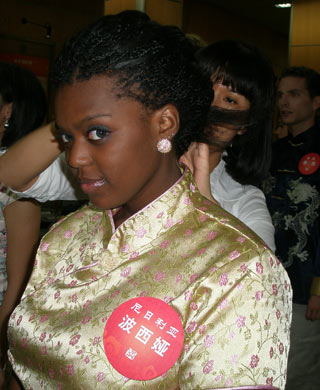Society
A tale of two faces
By Li Lianxing (China Daily)
Updated: 2011-02-12 09:38
 |
Large Medium Small |
The video of a female Russian TV host, Yakovleva Elizaveta, reporting news in Chinese on Jingzhou TV of Central China's Hubei province, has been sweeping the Chinese Internet, garnering more than 1 million clicks in a month.
News reporting calls for a high level of Mandarin fluency and Elizaveta's delivery is flawless as she reports on the opening of a new high-end department store in Jingzhou.
 |
|
Yakovleva Elizaveta from Russia reports news in Chinese on Jingzhou TV. [Photo Provided to China Daily] |
The Russian first came to China in 1987 at the age of 5, when her father was assigned to Beijing as an international correspondent by Channel One Russia, but left years later.
Returning intermittently she eventually majored in linguistics from Beijing Language and Culture University. Meeting all course requirements in two-and-half years, she graduated ahead of time.
Her Chinese learning was initially prompted by loneliness. She often spoke to her mirror image as a little girl to amuse herself, much to her parents' concern.
"I started learning Chinese on my own while attending Fangcaodi primary school," she says.
But Mandarin is now like her mother tongue. "My Chinese is much better than my Russian," Elizaveta says.
This came in handy in the pursuit of her dream to be a news reporter, influenced by her journalist parents.
"I knew it would be extremely challenging, but that is what attracted me," says Elizaveta, who was previously employed by Hong Kong TV and appeared on the provincial television station, under an exchange program.
Talking about her live reports on Jingzhou, she says it is so stressful that she can feel her voice trembling.
Some netizens have expressed doubts that she really understands what is happening around her, citing the formal and official style of the news sources. But Elizaveta is adamant that she knows exactly what was going on.
Another host, of a travel program on Travel TV, Fauziyya Shehu Balarabe from Nigeria, has also been raising viewer interest.
 |
|
Fauziyya Shehu Balarabe from Nigeria, host of a travel program on Travel TV. [Photo Provided to China Daily] |
Fauziyya came to China at the age of 2, along with her parents who worked as Hausa language experts with China Radio International. But unlike Elizaveta's family, hers settled down in Beijing, returning to their hometown only during vacations.
But for the third year undergraduate student of medicine in South-East University, hosting TV shows is less a profession than a hobby.
Fauziyya's fluent Chinese and exceptional understanding of Chinese culture won her the Bronze medal at the 8th Chinese Bridge - Chinese Proficiency Competition for Foreign College Students, organized by the Confucius Institute Headquarters in August 2010. Her award caught the attention of the director of a travel program on Travel TV who invited her to host a series of programs in Jiangxi province.
As guest host, she went into the homes of several farmer families for a first-hand taste of farm life.
"I harvested oranges, grabbed crabs, and fed wild geese," she says. "It was difficult but also very interesting."
Both Elizaveta and Fauzziyya have been dubbed "Chinese hearts with foreign faces", and their appearance on TV has created quite a stir.
"While seeing a foreign TV host hosting English or language-teaching programs in China is hardly novel," writes one netizen, "it is so unusual to see a foreigner doing live news reporting in Chinese."
But there are also critical voices. "I think this is just a stunt by TV stations. When the novelty passes, we will focus on the content of programs and not care about who is hosting them," writes another.
Meanwhile, Zhong Ziyuan from the China University of Communication says: "International television stations recruit people from different backgrounds to give their programs a sense of internationalism.
"However, it is unnecessary for local stations to employ a foreign host. In fact, his or her appearance may even distract people's attention and influence the way information is relayed," Zhong says.
"This should not be encouraged."